|
|
|
|
 |
|
Lake Eaton at the FWC Ocala Conservation Camp.
|
|
Director's Corner
Jonathan Dain, NRLI Director
Seasons Greetings, Firsts, and Soak Time
On behalf of the NRLI Project Team, I would like to extend best wishes and seasons greetings to all of you! May the coming year bring you contentment, peace, and prosperity. May it also bring you what a NRLI Fellow once called "soak time," a chance to reflect on your unflagging efforts to manage and protect the remarkable natural resources and ecosystems that sustain the people and economy of Florida.
I suspect that most of us are ready for a little break in our routines right about now. It has been an eventful fall in Florida and the thought of a few days off beckons like, well, the thought of a few days off... That said, here at NRLI we approach the end of 2017 feeling gratified and excited. We are thrilled to have Jessica Ireland and Joy Hazell back with us after their respective breaks from NRLI (Jessica - maternity leave; Joy - Fulbright Fellowship). Along with Paul Monaghan and Wendy-Lin Bartels, they form the unique, highly talented, and experienced Project Team that makes NRLI such an impactful program.
In April, we graduated a successful NRLI Class XVI bringing the total number of NRLI alumni to almost 300. Class XVI sessions in places like Key West (Marine Protected Areas) and St. Augustine (Sea Level Rise) exposed us to new locations and demonstrated once again that Florida is on the cutting edge of both natural resource challenges and solutions. To date, the NRLI program has studied important issues in more than 75 locations around the state of Florida. From Florida panthers and shipping ports to dairies, the space center, and the red snapper fishery, we have covered a lot of territory.
The clock never stops, and 21 new Fellows began the NRLI Program as Class XVII in August 2017. It is already a class of firsts. At the opening session in Fort Myers-- focused on water quality and estuary health--alumni from four different cohorts joined us for the inaugural "Alumni Roundtable," a new addition to the curriculum designed to facilitate the bridging of cohorts. Shortly thereafter came a more challenging first--the cancellation of the September session due to Hurricane Irma. As a result, we conducted the first ever NRLI webinar in November. It was a surprisingly interactive experience and fruitful enough to ensure that we will continue to experiment with webinars.
Another exciting first in 2017 was a Fall Alumni Gathering. On Thursday, November 16, fifteen alumni from a variety of NRLI classes met at the FWC Conservation Center in the Ocala National Forest coinciding with session 4 of Class XVII. The Fall Alumni Gathering consisted of an update on the state of NRLI, a continuing education session focused on power dynamics, a presentation by the NRLI Alumni Association, a cross-cohort networking activity, and a catered evening dinner and social complete with a roaring bonfire under the stars. This marked the first time NRLI has held a formal alumni event outside of graduation--and it was an energizing success. We learned a good deal about what alumni and Fellows find useful and enjoyable and also how we can improve such gatherings in the future. Thank you to those who were able to come; it was an absolute pleasure to spend time with you, and we are glad that you found the experience worthwhile.
The final "first" of this eventful 2017 occurred just last week. In addition to a new focus on alumni engagement, a second initiative is what we are calling our "portfolio of training options." We are now offering shorter, more intense versions of NRLI for those who cannot commit to the full 9-month program. One option consists of four 2-day sessions in one location over the course of a few months. Think of it as NRLI content without the fieldtrips, stakeholder panels, and diversity of institutions. Last week, we held the first session of the first such training with staff from the Suwanee River Water Management District and the University of Florida. We were thrilled that SRWMD Director and NRLI Class XI alumnus Hugh Thomas joined us to provide the opening remarks. In January, we will initiate a similar specialized program for staff of the Florida Department of Environmental Protection, also four 2-day sessions. The plan is that graduates of these programs will connect with NRLI alumni in their institutions and use them as leadership mentors.
We hope that 2018 will bring more firsts to NRLI. Thank you for allowing me to indulge in some NRLI "soak time." Happy Holidays, enjoy your break, and see you next year!
|
|
|
|
|
|
Class XVII Session 4
Wildlife Management: The Florida Black Bear
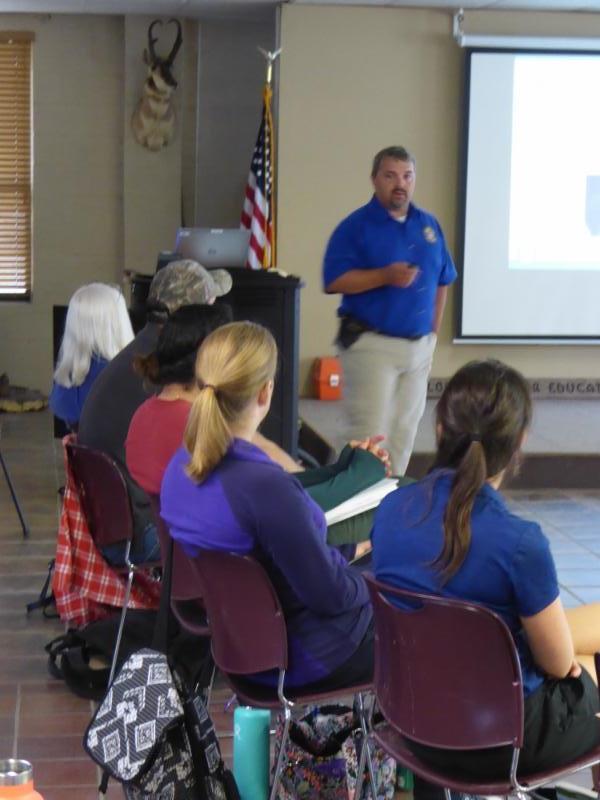
Session 4 was held in Ocala, Florida and focused on Florida Black Bear management. Mike Orlando, Assistant Coordinator, Florida Fish and Wildlife Conservation Commission (FWC) Black Bear Management Program, provided an overview presentation of Florida Black Bear management on Wednesday, November 15. Mike was able to have a roadkill bear brought to the center so that the group could observe measurements and samples being taken firsthand, and learn about how the resulting data is used. This was a once in a lifetime experience for many in our group, and it added immensely to the session. For the field trip on Thursday, November 16, FWC Fish and Wildlife Research Institute Bear Research Coordinator Walter McCown led the group on a Florida Black Bear ecology hike, showing the 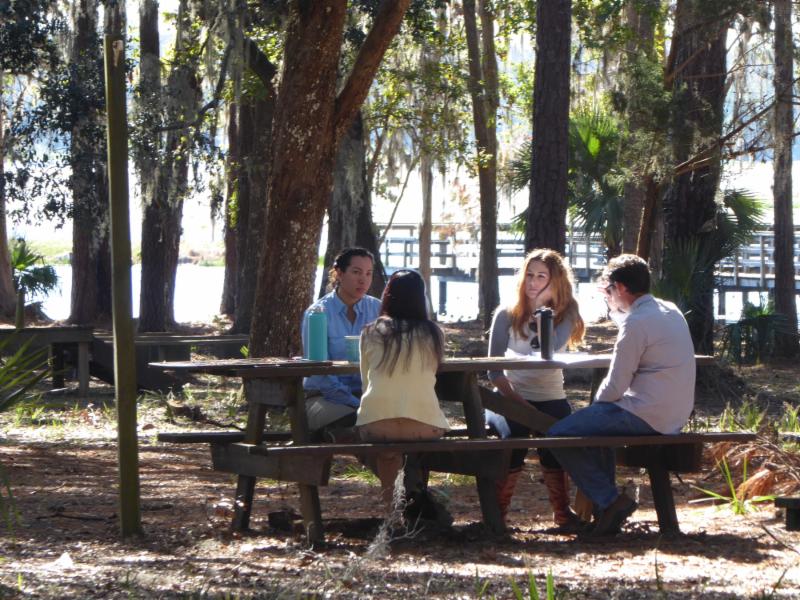 group bear signs, including scat, a den, trails, and scavenging. He provided a wealth of information on bear habitat, taxonomy, behavior, breeding and reproduction, and diet. group bear signs, including scat, a den, trails, and scavenging. He provided a wealth of information on bear habitat, taxonomy, behavior, breeding and reproduction, and diet.
At each monthly session, the Project Team invites 4-6 people who represent a range of viewpoints and have first-hand knowledge of the topic to share their experiences and perspectives with the group. For this session, small groups of Fellows interviewed stakeholders, which provided an opportunity to practice developing interview questions and listening. Stakeholders who joined us were:
- Gary Kaleita - Longwood HOA (Florida's first BearWise neighborhood); Attorney
- Dan Kon - Chairman of Imagine Our Florida; Photographer
- Sam Rolando - Area Manager, Juniper Springs Recreation Area
- Kristee Booth - Environmental consultant, Florida Department of Transportation
- Ben & LouAnn Williams - Wetland Preserve, LLC (large acreage property owners, timber company)
- Allie Goodin - Native Dog Supply; Dixieland Dog Hunters; United Houndsmen Of Florida; Central Florida Bear Hunters ; Southern Hunting Dog Alliance
- Alyssa Simmons, Biologist, FWC Bear Management Program; Coordinator of Central Bear Management Unit Stakeholder Group
- Elizabeth Fleming, Senior Florida Representative, Defenders of Wildlife
|
Each month, we ask a pair of Fellows to review the session in their own words. This article describes reflections from the point of view of Fellows Rebecca Elliott & Brent Bachelder.
|
Fellows' Article
Building Strong Interpersonal Relationships
By Rebecca Elliott & Brent Bachelder
The University of Florida Institute of Food and Agricultural Sciences Natural Resource Leadership Institute's (NRLI) Class XVII found themselves in bear country during their fourth session. Surrounded by the deep woods of Ocala National Forest, the NRLI group and their guests spent three days exploring the issue of Florida Black Bear management. One could not have chosen a more ideal location. Not only is the Forest a hub for one of Florida's largest bear populations, but the setting also provided a rich summer camp-esque bonding experience. Fellows bunked together in cabins, cooked breakfasts together, swapped stories in the moonlight, and enjoyed smores by the campfire. Of course, these wistful activities were just the bookends to the typically furious NRLI pace of learning about the dynamics of a contentious topic and conflict management techniques. Reflecting on their experiences in Ocala, NRLI Fellows now realize how much session four brought them together - and provided them with the skills to build meaningful relationships with stakeholders.
In Ocala, NRLI was lucky enough to have Florida Fish and Wildlife Conservation Commission bear experts on hand. Mike Orlando provided a briefing on bear management. Both bear and human populations have experienced increases in recent years. This has resulted in an increased frequency of human-bear interactions. These interactions were highlighted by the presence of a recently road-killed bear. NRLI Fellows collected biological information from this animal, a profound experience for all in attendance. An important message from Mr. Orlando's presentation was that bear management is human management. As Florida citizens, we all contribute to responsible bear management. Mr. Orlando's presentation also did more than provide a report on bear biology and management. It was a great example of how an enthusiastic and entertaining presentation can increase the effectiveness of information delivery.
It was time for questions about questions. It is not just the question that matters, it's the purpose and timing that gets results. Just four well thought out and timed questions can get you where you want to go? Maybe six to ten? Start with broad concepts and spiral down the funnel to narrow the focus on what you really want to know. This is how funneling questions allows information to flow. Warm-ups, follow-ups, probing, and funnel to the difficult issue - think before you question!
A major focus in Ocala was developing one on one stakeholder engagement techniques and skills. The Project Team arranged participation by a group of nine bear management stakeholders. The number of stakeholders provided NRLI Fellows the opportunity to conduct individual stakeholder interviews. This was a break from the utilization of panel discussions that had been practiced during previous sessions. The conversational flow between stakeholder and interviewer clearly has benefits in many situations. Interviews encouraged building a stronger personal connection with stakeholders. Funneling questions were asked, skills were practiced, connections were made, and important insights were gained from each stakeholder.
Acting out the Vision
Late in the day, it was to the outside pavilion for visioning techniques. Life is good, but energy was low. Enjoy the woods, seek out caffeine, and hope for inspiration to figure out how specific scenarios could unfold. What could happen to move things in different directions or no direction at all? Visioning informs, but the Fellows were tired and were pushing themselves and each other to just get it done in the time allowed. But wait! They must also creatively present their scenarios to the other fellows? A team member came up with a clever and workable idea and everyone perked up. Energy flowed, flip board pages rustled back to life along with the Fellows, and fun ensued over the possibilities as informative ideas and creative energies were acted out.
Finally, the Forest turned out to be a perfect backdrop for the first annual convergence of the NRLI Alumni Association and the NRLI class in progress. Past and current Fellows were brought together away from their routine settings to share each other's company, camper style, with food and drink, a blazing bon fire, and a starry night by the lake complete with a meteor shower. Many questions were asked and answered. Current Fellows learned about building on the NRLI experience. In small groups and one-on-one, networking was abundant. Help and support on developing practicums was particularly timely. Special thanks to the alumni who presented on Friday morning and worked with the different groups to encourage their efforts.
|
|
NRLI Toolbox:
Fishbowl
A fishbowl is a facilitation technique used to foster dialogue and storytelling, while also promoting listening and collective understanding. To conduct a fishbowl, arrange 5-6 chairs in a central circle and invite the speakers to share their knowledge and experiences with one another in response to guiding questions from the facilitator. The remaining participants, who sit in an outer circle, adopt the role of observer and listener. The technique can be especially challenging (and powerful) for participants who may traditionally consider themselves as "the experts" on a given topic. They are usually surprised at how difficult it is to listen quietly to others without interrupting. Following the inner circle discussion, the facilitator can invite observers to ask questions or comment on what they heard. For more information, check out this resource: http://slitoolkit.ohchr.org/data/downloads/fishbowl.pdf. |
|
Report on Fall 2017 Alumni Gathering
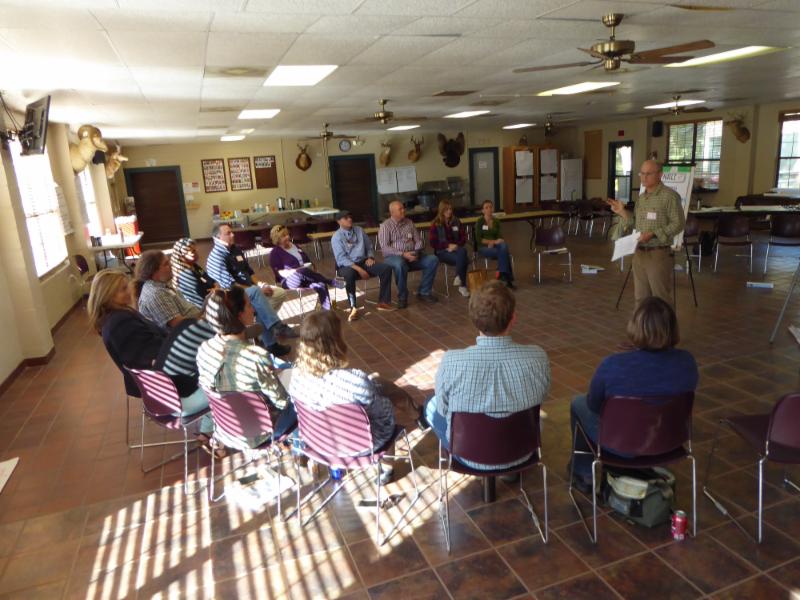
On Thursday, November 16, fifteen NRLI alumni attended the 2017 Fall Alumni Gathering - an event that was designed to foster learning and networking. The afternoon began at 2:30 p.m. with a welcome timeline activity that reconnected old friends and catalyzed new cross-cohort associations. An update on NRLI from the Director Jonathan Dain reviewed the program's evolution and highlighted its expanded capacity for statewide impact as the network reaches 300 members. Alumni 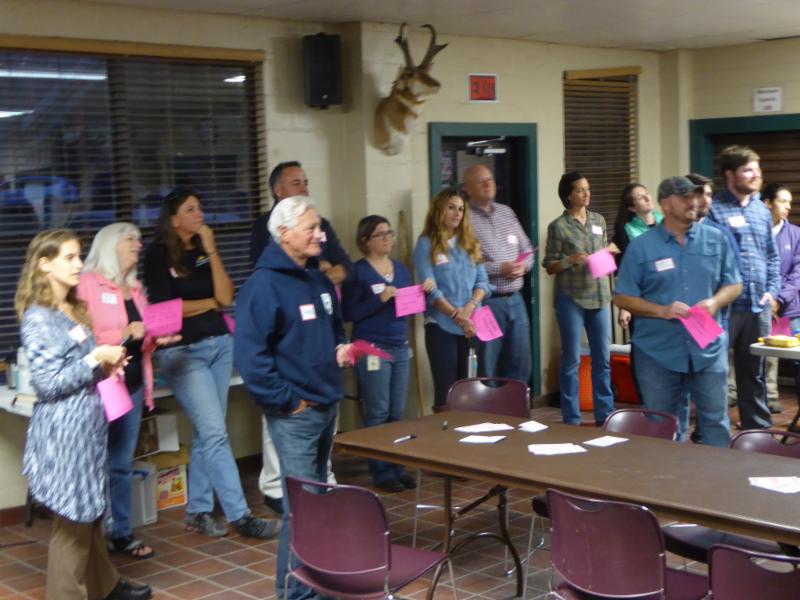 offered feedback to the Project Team on ideas for energizing and harnessing the alumni NRLI network. Jon then led an educational refresher course that featured approaches for recognizing and addressing issues of power. As the afternoon wound down, Wendy-Lin Bartels facilitated a structured informal activity to encourage networking among alumni and current Fellows. To close the session, Chad Rischar provided an update from the NRLI Alumni Association. Conversations continued during dinner, around the bonfire, offered feedback to the Project Team on ideas for energizing and harnessing the alumni NRLI network. Jon then led an educational refresher course that featured approaches for recognizing and addressing issues of power. As the afternoon wound down, Wendy-Lin Bartels facilitated a structured informal activity to encourage networking among alumni and current Fellows. To close the session, Chad Rischar provided an update from the NRLI Alumni Association. Conversations continued during dinner, around the bonfire, 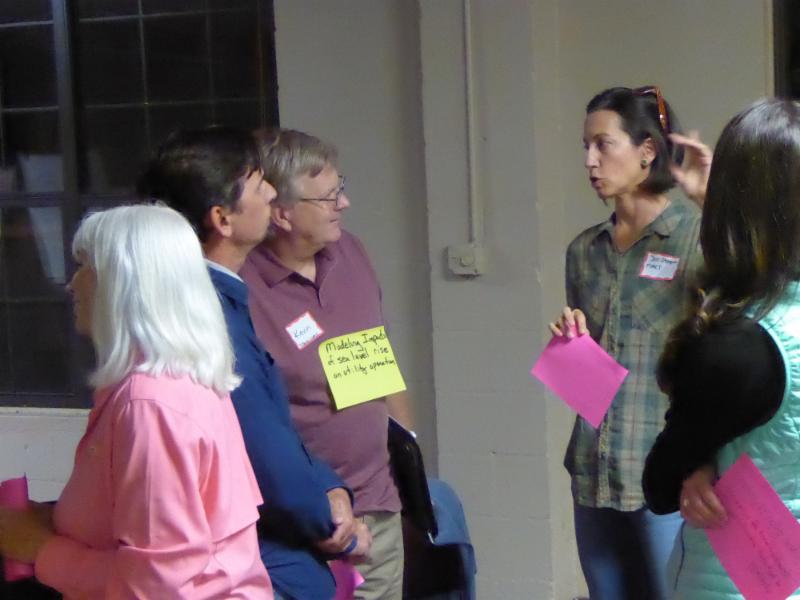 and into the night on the dock of Lake Eaton--to the occasional "Oooh" and "Aaah"--as shooting stars danced across the sky and reflected on the waters below. and into the night on the dock of Lake Eaton--to the occasional "Oooh" and "Aaah"--as shooting stars danced across the sky and reflected on the waters below.
We recognize and thank the following alumni for participating in the Fall Gathering and encourage everyone to save-the-date for our Spring Gathering (Friday, April 20 in Gainesville in conjunction with the Class XVII graduation).
Gian Basili (Class IV), Ann Moore (Class 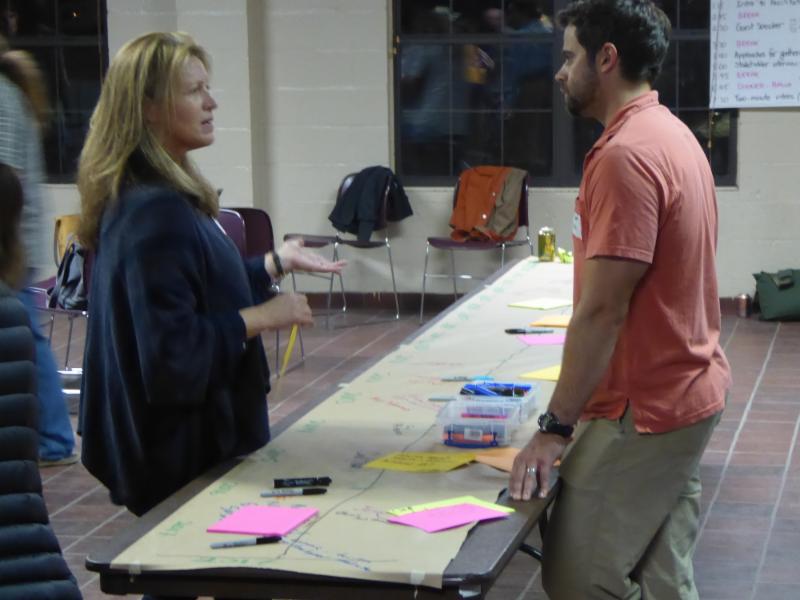 IV), Jennifer Winters (Class VIII), Carolyn Cox (Class XI), Stacie Greco (Class XII), Craig Faulhaber (Class XIII), Maria Sgambati (Class XIII), Clay Coarsey (Class XIV), Chad Rischar (Class XV), Erika Zambello (Class XVI), Jessica Stempien (Class XVI) , Savanna Barry (Class XVI), Basil Iannone (Class XVI), Phillip Stokes (Class XVI), and Margaret Guyette (Class XVI). IV), Jennifer Winters (Class VIII), Carolyn Cox (Class XI), Stacie Greco (Class XII), Craig Faulhaber (Class XIII), Maria Sgambati (Class XIII), Clay Coarsey (Class XIV), Chad Rischar (Class XV), Erika Zambello (Class XVI), Jessica Stempien (Class XVI) , Savanna Barry (Class XVI), Basil Iannone (Class XVI), Phillip Stokes (Class XVI), and Margaret Guyette (Class XVI).
|
|
Spotlight on Class XVII Fellows
Kevin Morris
M
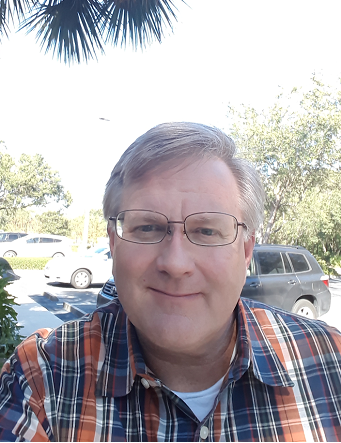 r. Morris is the Science & Technology Officer and Manager of Engineering & Projects for the Peace River Manasota Regional Water Supply Authority. He has been with the Authority since 1999 and has 30 years of experience in the water and wastewater industry. He has managed the design and construction of more than $250 million in CIP projects. He has spent much of the past decade developing system reliability and budget models and he enjoys those challenges. He also enjoys serving as a high school mentor, volunteering for STEM events like the toothpick bridge contests and Math Counts. He and his wife live in Manatee County, they have one son who is an avid high school rower and so most weekends he can be found volunteering as a cook in the food tent alongside a waterway somewhere in our great state.
Education:
BS & MS, Environmental Engineering, University of Central Florida
MBA, Florida State University
Certifications:
Engineering: Professional Engineer, Board Certified Environmental Engineer, Systems Engineering Professional
Government: Public Purchasing Officer & Government Finance Manager
General: Six Sigma Green Belt, LEED GA, Env. SP
Rachael Santana
Racha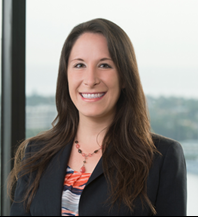 el is an Environmental and Land Use attorney with the law firm of Lewis, Longman, & Walker and is based out of the firm's West Palm Beach office. Rachael is a proud member of the Gator Nation, having received her Bachelors of the Arts, cum laude, in English and Anthropology followed by her law degree from the Levin College of Law with a Certificate in Environmental and Land Use Law. During her tenure at UF, she was co-chair of the Public Interest Environmental Conference and a member of Gators for Alternative Dispute Resolution. el is an Environmental and Land Use attorney with the law firm of Lewis, Longman, & Walker and is based out of the firm's West Palm Beach office. Rachael is a proud member of the Gator Nation, having received her Bachelors of the Arts, cum laude, in English and Anthropology followed by her law degree from the Levin College of Law with a Certificate in Environmental and Land Use Law. During her tenure at UF, she was co-chair of the Public Interest Environmental Conference and a member of Gators for Alternative Dispute Resolution.
Rachael's law practice includes representation of the private sector, as well as government entities, in the complex and ever-evolving world of environmental and land use law in Florida. Rachael works closely with clients to listen and understand their strategic objectives in order to contextualize and advance those objectives within Florida's legal and regulatory system. This includes both obtaining and defending regulatory permits, as well as challenging administrative decisions of agencies at the local, state, and federal level.
Rachael is also an Executive Council Member of the Florida Bar's Environmental and Land Use Law Section and Co-Chair of the Natural Resources Committee. In her free time Rachael enjoys reading, gardening, and exploring the uninhabited environment.
Charles Barrett
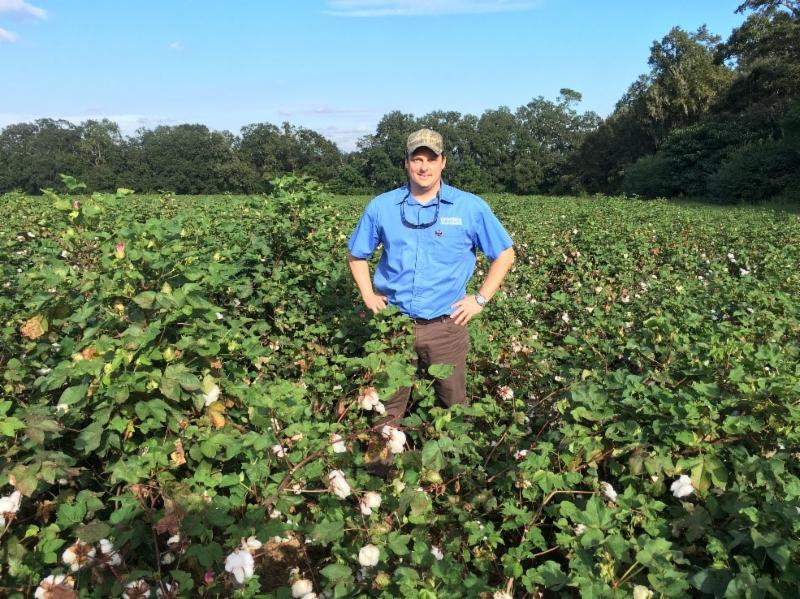 Charles is a Regional Specialized Agent, Water Resources, at the Suwannee Valley Agricultural Extension Center. Charles focuses on agricultural irrigation and nutrient management best practices education and water issues education for elected officials and stakeholders. His objectives are to create educational programs for agents in form of in-service trainings and provide support for their programs when a water resources or irrigation specialist is necessary. Charles works closely with the water management districts, the Florida Department of Agriculture and Consumer Services, the Florida Department of Environmental Protection, the Suwannee River Partnership, and the soil/water conservation districts. Charles provides assistance with: Charles is a Regional Specialized Agent, Water Resources, at the Suwannee Valley Agricultural Extension Center. Charles focuses on agricultural irrigation and nutrient management best practices education and water issues education for elected officials and stakeholders. His objectives are to create educational programs for agents in form of in-service trainings and provide support for their programs when a water resources or irrigation specialist is necessary. Charles works closely with the water management districts, the Florida Department of Agriculture and Consumer Services, the Florida Department of Environmental Protection, the Suwannee River Partnership, and the soil/water conservation districts. Charles provides assistance with:
- Irrigation scheduling
- Soil moisture sensors
- Water schools
- Community water issues
- Water related legislation and regulations:
- Total Maximum Daily Loads, Basin Management Action Plans, Minimum Flows and Minimum Water Levels
Elizabeth Ramirez
Liz Ramirez i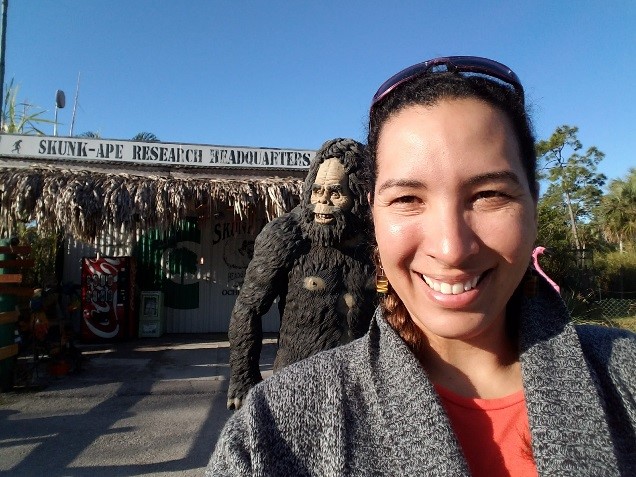 s a wildlife biologist for the USDA Forest Service in Ocala National Forest. She focuses on habitat restoration for endangered and threatened species and also strides to eradicate invasive, exotic species across 384,000 acres in a uniquely forested land in central Florida. s a wildlife biologist for the USDA Forest Service in Ocala National Forest. She focuses on habitat restoration for endangered and threatened species and also strides to eradicate invasive, exotic species across 384,000 acres in a uniquely forested land in central Florida.
Liz attended college through the 2 + 2 program for the Forest Service where she earned her associate's degree from Florida A & M University then graduated with a Bachelor's of Science in School of Forest Resources and Conservation from the University of Florida. There she continued her studies at UF earning a Master's Degree in Wildlife Ecology and Conservation studying the effects of forest restoration on habitat suitability for red-cockaded woodpeckers.
While she grew up in the city of Miami, she enjoyed being lost in woods. She has trained to be a wildland firefighter, Project Learning Tree instructor, tree climb instructor, along with other skills that has brought her all over the country from Florida's Big Cypress National Preserve to Alaska's Tongass National Forest. Today, she reaches out to several universities and intern programs to help spread the idea of conservation and becoming a steward of the land.
|
|
Thank you!
A huge thank you to alumni Matt Wegener and Erika Zambello (Class XVI) for all of their help with the red snapper session. Matt and Erika helped the Project Team with logistics, including finding a hotel venue and arranging the field trip, as well as identifying and contacting stakeholders. Thank you, Matt and Erika, for all of your time and efforts; it was a great session thanks to your help!
Thank you to alumna Angeline Scotten (Class XV) for her help with the Black Bear management session. Angeline helped us with session planning and put us in touch with key staff at FWC. Thank you, also, to Dave Telesco, Mike Orlando, Walter McCown, and Alyssa Simmons with FWC for their assistance with the session.
|
|
Class XVII Fellows
|
Lisa Aley,
Planning Technical Lead, Restoration Section, Jacksonville District, U.S. Army Corps of Engineers
|
Charles Barrett, Water Resources Regional Specialized Agent, Northeast District, University of Florida/IFAS Extension
|
Brent Bachelder, Fisheries and Wildlife Biological Scientist, Florida Fish and Wildlife Conservation Commission
|
| Katie Britt, Environmental Consultant, Water Quality Restoration Program, Division of Environmental Assessment and Restoration, Florida Department of Environmental Protection |
| Edward Camp, Assistant Professor, Fisheries and Aquatic Sciences, School of Forest Resources and Conservation, University of Florida |
| Paloma Carton de Grammont, ProForest Coordinator, School of Forest Resources and Conservation, University of Florida |
| John Dooner, Forester, Southern Forestry Consultants, Inc. |
|
Rebecca Elliott,
Environmental Manager, Florida Department of Agriculture and Consumer Services, Office of Agricultural Water Policy
|
| Amy Fenwick Reaume, Conservation Manager, Brevard Zoo |
| Caroline Gorga, Species and Habitat Monitoring Wildlife Legacy Biologist, Florida Fish and Wildlife Conservation Commission |
| Andrew G Gude, Refuge Manager, Lower Suwannee and Cedar Keys National Wildlife Refuges, U.S. Fish & Wildlife Service |
| Mary Lusk, Water Resources Regional Specialized Agent, South Central District, University of Florida/IFAS Extension |
|
Michael Lusk,
Refuge Manager, Okefenokee National Wildlife Refuge, U.S. Fish and Wildlife Service
|
| Nia Morales, Human Dimensions Specialist, Fish and Wildlife Research Institute |
| Kevin Morris, Science and Technology Officer and Manager of Engineering and Projects, Peace River Manasota Regional Water Supply Authority |
| Rachael Santana, Attorney, Lewis Longman & Walker, P.A. |
|
Elizabeth Ramirez,
Wildlife Biologist, U.S. Forest Service
|
|
Rachael Smith,
Communications Manager, Florida Farm Bureau Federation
|
| Tara Wade, Assistant Professor, Agricultural and Natural Resources Economics, Southwest Florida Research and Education Center, University of Florida/IFAS |
|
Barton Wilder,
Environmental Specialist III, Florida Department of Agriculture and Consumer Services, Office of Agricultural Water Policy
|
| Graham Williams, Land Manager, St. Johns River Water Management District |
|
|
Dates
|
Topic
|
Location
|
|
August 16-18, 2017
|
Water Quality & Estuary Health
|
Ft. Myers
|
|
September 13-15, 2017
|
POSTPONED DUE TO HURRICANE IRMA
|
|
|
October 18-20, 2017
|
Fisheries Management: Red Snapper
(Note: the October session was originally in Miami; we have cancelled the Miami session and will hold the Destin/Fort Walton session during these dates.)
|
Destin/
Fort Walton Beach
|
|
November 15-17, 2017
|
Wildlife Management: The Florida Black Bear
|
Ocala
|
January 17-19, 2018
|
Cattle Ranches & Land Easements
|
Sebring
|
February 14-16, 2018
|
Everglades Restoration & Perspectives from Communities
|
Clewiston
|
March 14-16, 2018
|
Endangered Springs
|
DeLand
|
April 18-20, 2018
|
Graduation & Practicum Presentations
|
Gainesville
|
|
|
|
|